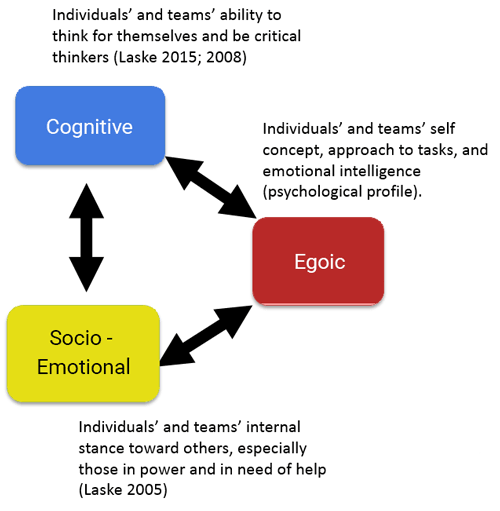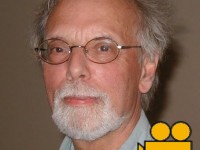The Laske Social Science Archive gathers Otto Laske’s writings on organizations written between 1999 and 2019, many of which have retained their value vis a vis new fashions of management thinking. Its sections are numbered chronologically. The Archive makes available both texts and slides, the latter for pedagogical purposes. The articles gathered are bundled according to topic. They can be downloaded free of charge. Archive VI gathers articles as well as teaching slides, copyrighted and to be used accordingly. Articles 2008 Anleitung zur kognitiven Prozessberatung 2010 Wirtschaftpsychologie 2012 Habecker MHD Bd. 1 Rezension 2012 Habecker, Jenseits aktiven Zuhoerens 2015 Der Mensch im Anthropozaen Workshop Slides (Folien) 2004 [Folien] Unsichtbare Dimension 2006 [Folien] Humanpotenziale 2007a [Folien] Einleitung in das Entw. Coaching 2007b [Folien] Konstanz-Berlin Einleitung in das Entwicklungscoaching 2007c [Folien[ Luzern Persoenlichkeitspotenziale 2008 [Folien] Einleitung in das Entwicklungscoaching 2013 {Folien] Einfuehrung in Tiefes Denken Eine Einleitung in dialektische Denkformen 2019 [Folien] Komplexes Denken Wien Read More...
Category: Presentations
Laske Social Science Archive, Section III: Teaching Slides (2005-2016) on Developmental and Cognitive Coaching
The Laske Social Science Archive gathers Otto Laske’s writings on organizations written between 1999 and 2019, many of which have retained their value vis a vis new fashions of management thinking. Its sections are numbered chronologically. The Archive makes available both texts and slides, the latter for pedagogical purposes. The articles gathered are bundled according to topic. They can be downloaded free of charge. Archive III gathers teaching slides, most of them focused on developmental coaching in the sense of CDF, the Constructive Developmental Framework. For the most part, the slides should speak for themselves. They are copyrighted and should be used accordingly. 2005a HR Interpreter Course 2005b Intro Dev. Process Consultation 2006a Insights-into-Coaching 2006b London Insights into Coaching 2006c Post-Bureaucratic Management 2006d The Right Coach at the Right Place 2007a Brussels Coach Meeting Feb. 07 2007b Building Out Human Sigma 2007c HR Innovation with CDF 2008a Invitation to Cognitive Consulting 2008b Invitation-to-Cognitive Process Consultation 2008c Insights into Coaching 2009a Lisbon Keynote O. Laske 2009b Nad Philip's seminar introduction to CDF (French) 2009c Stuart-Vurdelja Prague presentation 2015 ICC-IDM Webinar 2016 ICC-ICM Social Emotional Course 2016 ICC-IDM Cognitive Course This paper begins a long series of workshops on dialectical thinking a... Read More...
Laske Social Science Archive, Section I: Writings (2000-2003) on Requisite Organization and HR ‘Meta-Enablers’
The Laske Social Science Archive gathers Otto Laske's writings on organizations written between 1999 and 2019, many of which have retained their value vis a vis new fashions of management thinking. Its sections are numbered chronologically. The Archive makes available both texts and slides, the latter for pedagogical purposes. The articles gathered are bundled according to topic. They can be downloaded free of charge. Archive I gathers writings from between 2000 and 2003 most of which are focused on issues of requisite organization, particularly HR. The central concept introduced is that of META-ENABLERS. This concept answers concerns brought to life by the Score Card. Meta-enablers are social-emotional and cognitive criteria of relevance to HR and organizations at large. Some of the articles posted will be highlighted as to their focus starting in February of 2020. 2001a Linking Two Lines of Adult Development 2001b A learning and growth metric 2001c Non-requisite organization 2001d Non-Tangible_Human_Resources 2001e The_Next-Step 2001f What do Meta-enablers add 2001g What_Lies_Beyond 2002a Exec. Dev. as Adult Dev 2002b How to get it wrong both ways 2002c Human_Resources_Beyond_Domain_Competence 2002d Growing the Top Management Team 2002e The Place where Work Happens 2003a A New Data Type 2003b Org._Learning_&_Dev. Read More...
CDF Described in Japanese, Spanish, Italian, and German
in the four entries below, the reader finds four Wikipedia descriptions of CDF, the Constructive Developmental Framework, in Japanese, Spanish, Italian, and German, respectively.The English version of the Wikipedia article on CDF is found at: The original Wikipedia text, written in German, is owed to Prof. Bruno Frischherz, Hochschule fuer Wirtschaft, Luzern, Switzerland. Nick Shannon, London, UK, translated the German version into English. The translations of the English version were made by my students Yohei Kato (Japan), Daniel Alvarez Lama (Spain), and Marco Di Monte (Italy). Matthias Lehmann, Germany, was the coordinator. While it is outwardly a suite of assessment instruments that support semi-structured social-emotional and cognitive interviewing in organizations, respectively, CDF is more than a methodology of research. It has developed into a consulting approach, a teaching approach, and a coaching approach, all of them favoring a dialogical over a monological strategy for working with clients, whether individuals or teams. CDF is therefore best viewed as a methodology for developmentally deepened process consultation in the sense of Edgar Schein's work. 構成主義的発達論のフレームワーク (Yohei Kato) CDF Wikipedia Article, Español (Daniel Alvarez Lama) CDF Wikipedia Italian (Marco Di Monte) CDF Wikipedia Article original (Bruno Frischherz) *** Writings about CDF -- articles and... Read More...
New Dialog Methods for Broad-Spectrum Systems Constellations: Comments on the Milano Workshop on Intelligenza Collaborativa Nel Team
As shown at and, on this website, at , a workshop on new dialog methods specifically for creating collaborative intelligence in teams will take place in Milano, Italy, on January 30-31,2018. The workshop is offered by Consulenza Evolutiva, Milano and its Altroove School, and staffed by Lorenzo Campese, Alessandro Rossi, and Otto Laske. The workshop is a pioneering first in that it introduces Broad-Spectrum Systems Constellations which broaden the focus of attention of conventional constellations as detailed in the attached pdf. The workshop is held both in Italian and English. Those interested in signing up for the workshop with Consulenza Evolutiva will find further details on the workshop process below. Broad-Spectrum Systems Constellations Read More...
Effective Team Coaching: Juggling Personalities and Roles
Teams are usually viewed as "flat", disregarding that each of their members is active on a specific level of accountability associated with a specific universe of discourse. What team members are thinking and saying is thus not determined not only by their developmental size of person, but also by the size of their organizational role, and their understanding of the relationship between the two. A team coach or team leader who is disregarding this fact is going to be less effective that s(he) could be. In this webinar, Otto Laske outlines a typology of teams in which both team members' size of person and size of role receive due attention. Read More...

